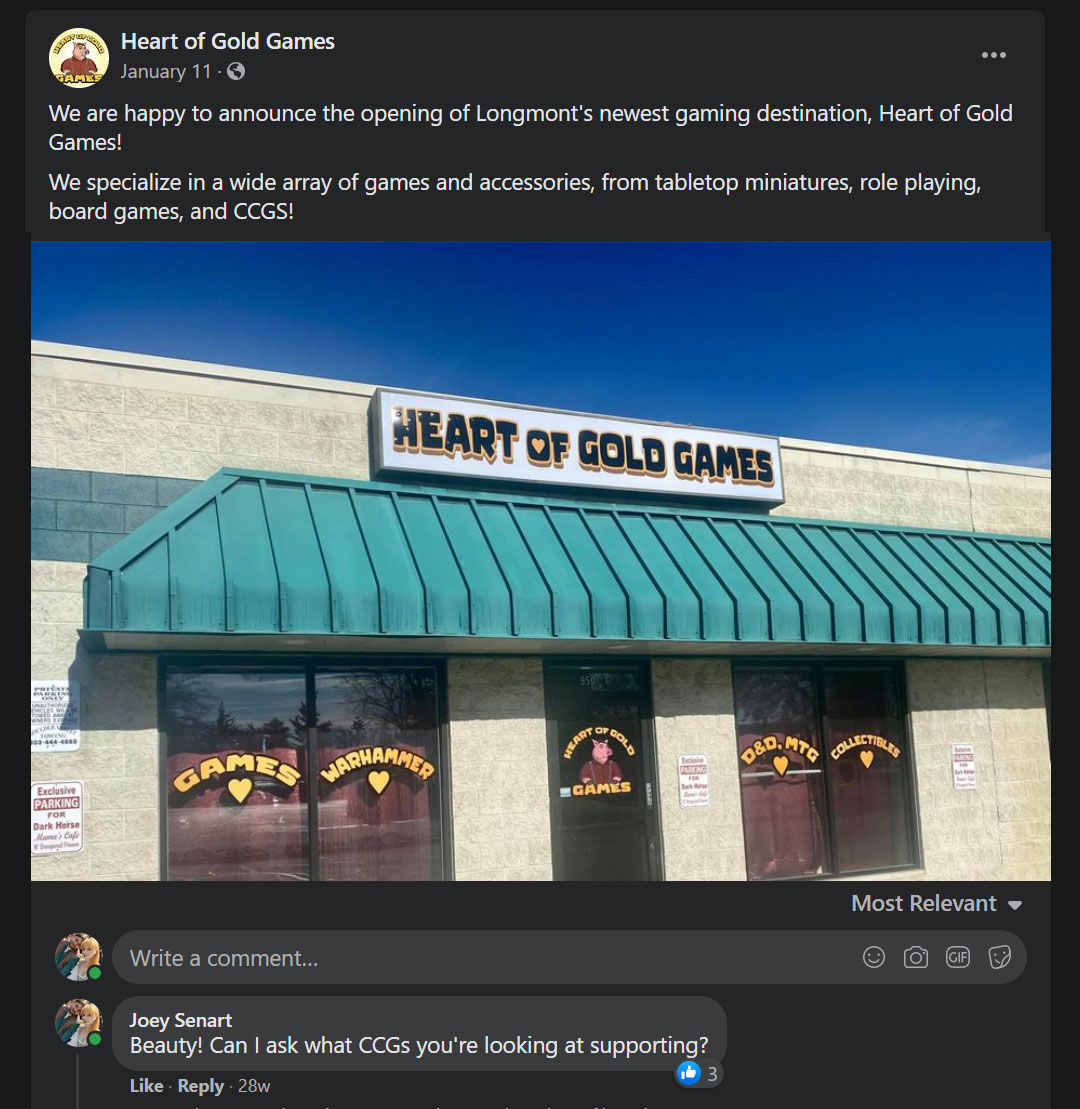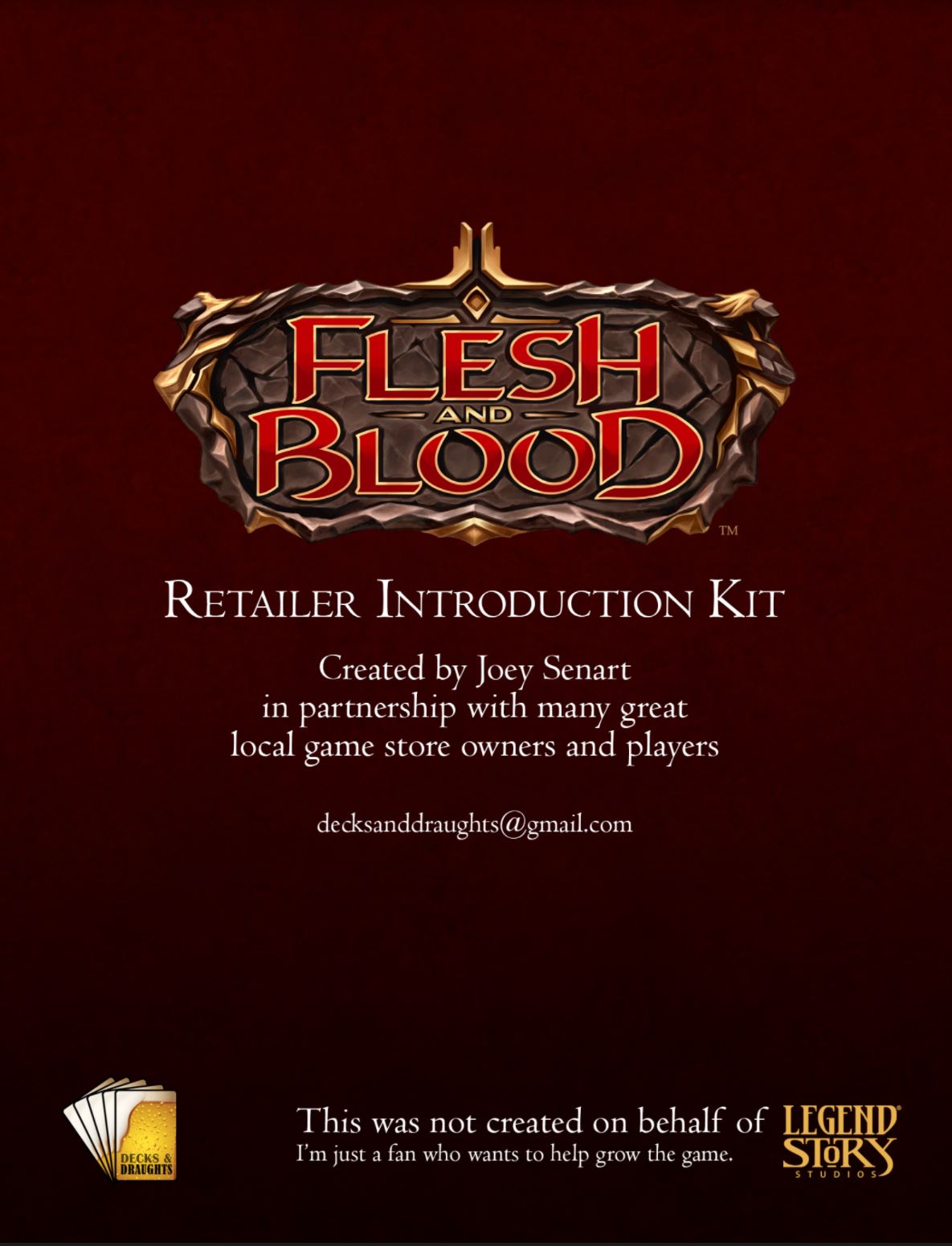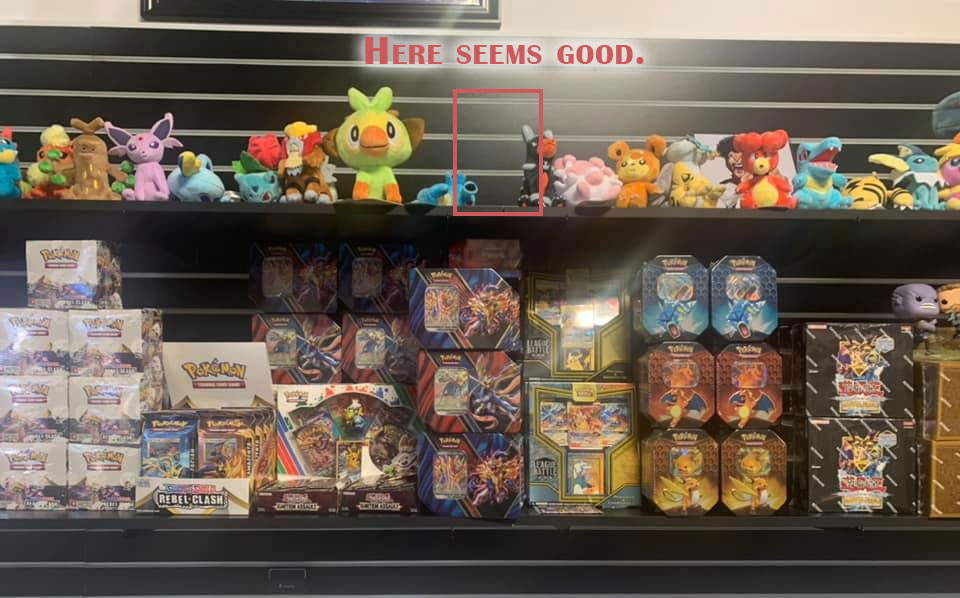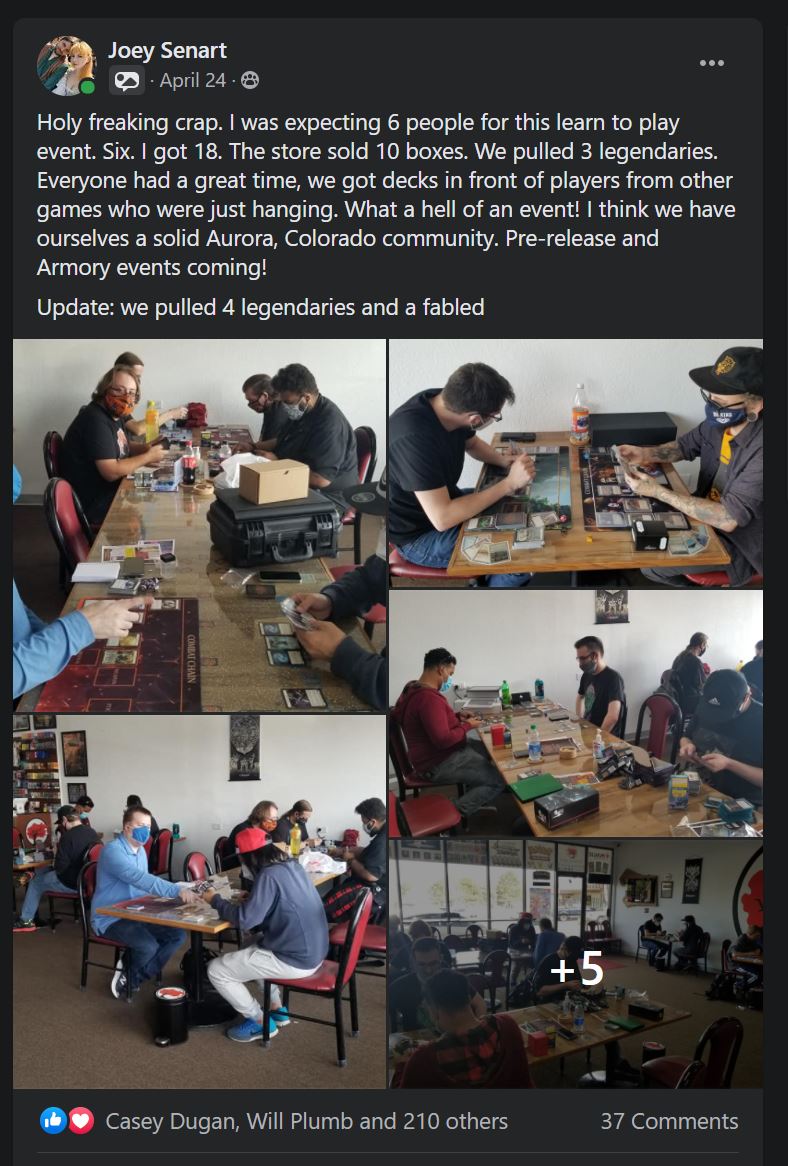In Part 1 of Joey Senart's series on building a local community, we talked about generating awareness and pitching the game to potential players. Today, he turns his attention to the local game store.
Have You Heard About Our Lord and Savior Flesh and Blood?
Sure, it’s a funny line, but as a business and a buyer, no responsible game store owner responds with, “Ooh, tell me more! How do I flood my store with this magical new product?!”
In Part 1 of my Art of Community Building series, I talked about the risks that a store takes on with a new game and the likelihood that “the next big thing” is going to be “the next big thing on clearance.” (If you missed my article on generating awareness, I encourage you to check that out here.)
Generating awareness is a great way to get a store owner to consider a product; if people are asking, there’s a demand. If people are curious, there’s an opportunity. In this article, I want to talk about capitalizing on your hard work, and share some ideas on how to partner with your LGS to get events going.
DISCLAIMER: Every store owner defines success differently! This article is not meant to be taken as “Tips for Guaranteed Success!” This is simply what has worked for me, and what has at least let me stay in good graces with a store owner, even if they weren’t ready to give Flesh and Blood a try just yet.
1: Be a Champion- and Know What That Means!
I asked a variety of game store owners about the top contributing factor to them giving a game a try. 9 times out of 10, the winning factor was having a dedicated champion working with them, helping with events, consulting, growing, and talking about the game. Store owners are busy maintaining a place for you to gather. They don’t have time to learn and master every game they sell. Taking that pressure off them goes a long way.

Now, it’s important to differentiate between a champion and a passionate guy who won’t shut up about the game. Remember, you are NOT a salesman for Flesh and Blood. Annoying people who come in and hounding them about FAB is cool for nobody and a good way to get kicked out of a store.
A champion advocates for the game, but knows when it's appropriate to leave people be. Always at the ready, but never aggressive. Keep some starter decks in your car, get good at 1-minute explanations, offer up opportunities to learn when you can, maintain a positive and respectful attitude. That energy alone will get people thinking “this also looks like a good group of people who I’d want to play with.” If you’re a “salesman” of ANYTHING, it’s the community, not the game. Don’t forget that.
2: Put Work Into Your Relationship with Your LGS
Partnering with an LGS is just that: a partnership, not a glorified sales opportunity. You, as players, get access to organized play, product, etc. Store owners are pretty aware that, in return, that’s going to mean a steady stream of sales and just great recognition for the business. You don’t need that to be your main selling point here. It’s implied. However, to drive that symbiotic relationship, you shouldn’t be a self-serving jerk, nor should you demand the business put in all the effort. In short: Go meet people!

One of the first stores I reached out to in Colorado was Heart of Gold Games in Longmont. Flesh and Blood wasn’t on their radar. I introduced a little bit on Facebook, admittedly went a little more sales-y than I wanted to, but I just went to the store and said hi. It was a great spot! Tons of room. Owner, Mike, was great to talk to. And we just talked to start. How long has he been around? What kinds of events does he like to host? What does he play? What’s the experience he enjoys most about running a store?
Not that we went all buddy-buddy or anything, but I wanted to gauge how the experience I was hoping to bring was going to match how he functions as a store owner. Was he driven more by community-building or by competitive events? What was his knee-jerk reaction to unproven games? What did success look like to him, and what would he consider a failure?
By showing that I was taking a genuine interest in what was at top of his mind for events and supported product in general, it helped me with how to best introduce Flesh and Blood to his store. In a few short months, it’s become a hot spot in our local community, bringing in nearly a dozen players weekly and staking a claim as a top choice for random meetups.
**2.5: Know When To Walk Away**
I originally wanted to leave this out, but one of the most important parts about being a champion is to know when something, someone, or somewhere just isn’t right for the community. That uneasy feeling when talking to a store owner that they just don’t care, that you’re just going to be a wallet that brings in more wallets, that this isn't a place for growth, just a place for shelter. It happens- and if you have options around you, which I get some of you may not, know when to walk away. Some signs for me:
- All business and no joy. Sometimes it’s just clear someone is into things for the money, but you can get that through the initial conversation by any follow-up questions that owners ask. A lack of care for the event types, reluctance to just offer up space for a welcome event, a demeanor of “You’re just here. Say your stuff and leave or buy something.” Not that they should be as excited as you, but maybe a little interest in bringing a new audience to the store would be nice?
- No social media presence or follow-through. Why is this important? It’s hard to grow a community when your reach is limited to... well... your already-engaged Flesh and Blood community. To tap into the local store’s community, you need to be able to talk to it; and if a store doesn’t want to engage, content to take whatever walks through the door, you’re going to be doing all the work yourself and have to move that needle to an uncomfortable level of intrusive.
- A proven history of “them first.” Sometimes you know about a store already. You know games they’ve supported, tournaments they’ve run, communities they’ve housed. And sometimes you know the history of altercations, abuse, mistreatment, scalping, stealing prize support, and a general “my way or the highway” attitude that makes you feel like they are providing you a service and you will appreciate what you get. There’s no community that grows well in this environment. The first low turnout will be ridiculed. The first issue will be treated like a trend. If this is all you have, proceed with caution and confidence. But mostly caution.
3: Talk Like an Expert, Not Like a Fan
“Do you carry Flesh and Blood? …Well why not?” That’s a great way to get nowhere quickly. Part of being a good partner is being able to be more than just a customer. Even more than just an influencer. (Actually, I asked a few owners for their take on “influencers”, and “more trouble than their worth” came up verbatim more than once. It was interesting.)
Speaking Their Language: “I can fill your store with people” is translated to “you’re going to have a full house of people to deal with” if you’re an owner who was just left out to dry. It’s not as enticing as you think, but that’s why we do articles like this!

Think like a store owner! In tip 2, we learned about signs of success; now do some research. For Flesh and Blood, thankfully it’s out there (don’t worry, I’ve got my own resource for you I’m about to shill here in a sec). Here’s some good ones that might resonate:
- The creator was a Magic Pro so has a strong background in card games.
- LSS came out with a plan for worldwide scalability out of the gate, already featured in 2,000 stores worldwide with partnerships with 3 large printers in the US, Japan, and Belgium.
- It has surprisingly good margins (don’t have to know what they are, but the margins are good).
- OP kits have high value and are freely distributed.
This list could actually get long. Thankfully, I have you covered in the Retailer Introduction Kit! A great printout you can share with a store that has more interesting tidbits to kickstart their research into the game in ways other than, “It’s a great game! You should buy it!”
Focus on how the store actually stands to benefit, and try to be more creative than just sales. The events, support from the company, longevity, value, the things that don’t scream, “It’s on the players to make this game survive despite the company not knowing what it’s doing.” That is a much more attractive conversation.
Which, on that note...
4: Have. A. Plan.
Once upon a time, a customer told a store owner, “If you stock Flesh and Blood, I’ll buy it.” The store owner complied and the customer bought it. Now out of stock, the store owner ordered it again, and the customer bought it again. This continued until the store owner made a ton of money and the customer went bankrupt. The end.
I don’t know how this idea got popular. That’s not a thing.
I said it in my previous article as well, but the acclaim Flesh and Blood has right now doesn’t mean that a local community is going to support it enough to truly make it worth a store’s while.

Bringing a new game into a store means new inventory, shelf space used, perhaps a new relationship with a new distributor, time, effort, energy understanding a new product and their releases, etc. Add events into that, and now they’re signing up for things, getting promotional product that has to get put... somewhere, scheduling events... somewhere, creating a place to play... somewhere, marketing the event... somewhere.
It’s work! And a lot of it.
Think about what you can take off the store owner’s plate and approach them with a plan to success. I cannot emphasize how important and how valuable this is. You can be honest and say, “I don’t know what the local community could be like, but I’d love to find it and I think we could both win there.”
I’m a big fan of Learn To Play and Welcome events. I’m a bigger fan of them when you can supply the product and take the pressure off of both new players and the store to secure product. The Learn To Play Kit I developed has bulk decks that are cheap and easy to make and hand out... or just use and keep. If you can get your hands on the Ira decks, though I’m not a fan of them, that's a good way to go as well. Then share the work you’re willing to put in.
“What I’d love to do, if you’re interested, is run some learn to play events at your store. I’ll bring some of my bulk decks to show people the game. If you could promote it a little through your social media and add it to your calendars, that would be a huge help. No requirement for you to purchase product or anything like that. I’d rather people get interested and then ask where they can buy it, and we can go from there.”
If you are looking at Armory events, ask about how they like to run events. Do they prefer to do event running themselves? Or can you, or someone you find, take ownership of that when they happen? If you can have that in place, again, that’s one less thing they have to worry about. It just further strengthens this partnership.
RECAP
At the end of the day, it’s important that you’re not just a supporter, but truly interested in the success and growth of the game. Then, make it clear that your MO, your main objective, is that everybody wins. If you do a good job, everybody does. Players get places to play, stores get recognition and sales, LSS gets to see all of that success and they keep going with this amazing game of ours.
The more you can take off of a store owner, the easier it is for them to consider trying something new. Find what that balance is, and make sure to really build a relationship with them to do that. You’re partners in this. Hanging a store owner out to dry by convincing them to buy product then letting them figure out the rest is a good way to keep the game going for... maybe a month, but you’ve really just added more headache.
Then again, maybe stores are ok with that. Maybe that’s what they staff for. It’s really up to them, but I like to err on the side of caution. What’s more attractive? “Can you carry this game and run events? We have a lot of people looking for a store.” or “We have a lot of people looking for a store to play Flesh and Blood at. I’d love to work with you on how we can make that your location and try to take as much burden off you as I can.”

In being a good partner, it helps to understand what the business is really trying to do. What does success look like to them? What do they care about most? What concerns them about new products? Maybe something concerns them about Flesh and Blood? Don’t get defensive, do your research if you have to. I made up a guide that I hope will help, but there’s a whole community of players and store owners that can help with good answers too.
Once you get past that point, make sure you have a plan! Again, DON’T LEAVE STORES OUT TO DRY!
“Run an event for this game!”
“Ok, ummmm... what are my options? Commander?”
You can do better! Armory events, welcome events, you have options! I like to do Learn to Play events just to find that local audience, generate awareness, get people talking and curious. I’ve got more document fodder for you on that one as well.
With a partnership in place and event planned, the last part of this series will go over building on momentum. You have your chance to shine! Now what? How do you get the most out of the turnout, even if it’s low? How do you build on the all-important second event?
Part 3 closes us out, but in the meantime, share your thoughts! What’s worked for you? What challenges have you gone up against when working with stores? Or if you’re a store owner, what other tips do you have?
Thank you for reading and I’ll see you next time!




